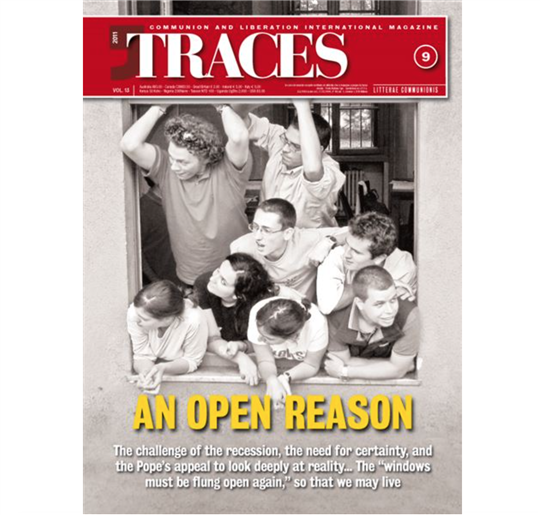
Traces N.9, October 2011
The Bunker and the WindowsIt’s hard to find a more concrete image: “a bunker with no windows, in which we ourselves provide lighting and atmospheric conditions.” A bunker, with no openings, no contact with the outside world. Just to think of it is stifling.
Yet this is the way we treat ourselves. We just have to look at ourselves to see how absorbed we are with that limited, reduced, suffocating, “positivist reason,” which Benedict XVI described with that image in his historic address to the Bundestag in Berlin in September. We only have to be honest with ourselves and look at how we address reality: work, family, study... How often we feel the space narrow and the air stifling and we feel surrounded by darkness! This is because the light and air we provide ourselves, or that we think we can provide ourselves, are simply not enough. Just as it is not enough to delude ourselves that if circumstances were different, if we were not where we are, but elsewhere, then things would be different; we are just fooling ourselves. It’s not enough to move to another room in the bunker in order to breathe. If reality is that and nothing else, if its density is limited to what we can measure; if we are–as we are–positivists, then we are short of air. That is why the image the Pope used is a powerful one. It is not that we can no longer discuss philosophy, speak of faith, or discuss with believers and non-believers; we cannot even live. And we long to live.
So, if we are loyal to this longing, the call that rang out a few lines later in that address becomes our cry: “The windows must be flung open again.” We have to let fresh air in, “we must see the wide world, the sky and the earth once more and learn to make proper use of all this.” We have to fathom the vastness of reality, because this vastness is not only a question of wide horizons but of depth, of density.
“All that is cries out its dependence on an Other,” Fr. Julián Carrón recalled during the CL Annual Beginning Day. “Our nature is that of being created, and our reason is fulfilled in acknowledging the ultimate implication within the being of things. If one denies the reference, if he rejects the beyond, if he denies the thing, the experience of the thing, he destroys it. In front of the colossal gratuitousness of reality, there is a kind of strange paralysis of reason, which becomes blocked. But if one denies this, he denies the thing.
If someone faces the problem of work, the economic crisis, or his child, without wonder at the very fact that they are there and are given to him, denying this implication, running away from that “ultimate implication,” he simply ends up denying them. He does away with them. Block reason; exclude the Mystery, and deny reality. It is like closing it in a dark, stifling room, only to discover that the breath of air we are waiting for is not there.
This is why the itinerary you will find in the Pope’s texts and in Page One of this month’s Traces is crucial. It is indispensable for living, even more now that the atmosphere is getting gloomy and we are feeling the word “crisis” on our own skin, instead of just hearing it (see the stories beginning on page 38). We can get bogged down in the good or bad circumstances, and stay there, gasping for air. Or we can use our reason for what it is, accept the challenge of that ultimate implication, not adding it, but discovering it present in reality. “It is as if within things there were an invitation,” says another passage from the Beginning Day. It’s up to us to accept it and open the windows.